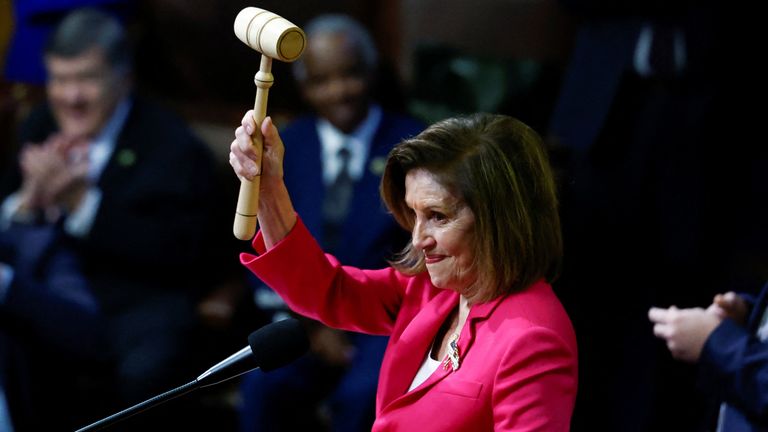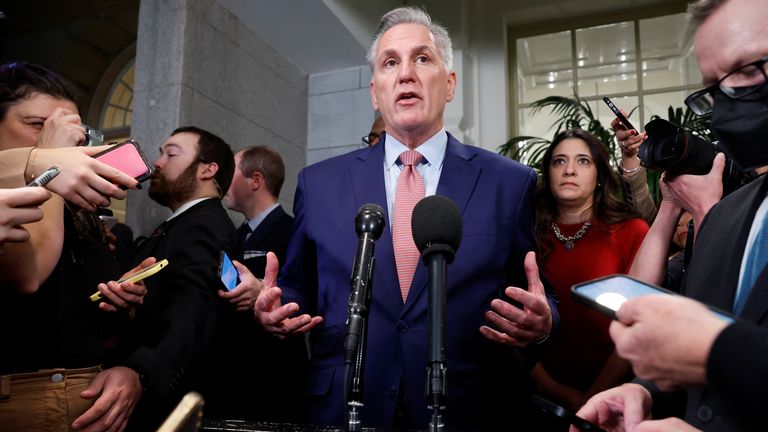Why the Republicans are struggling to pick a new House speaker
The majority and the power in the House was handed to the Republicans after the midterms, but there are two key reasons why the party is struggling to choose a new speaker.
Wednesday 4 January 2023 20:57, UK
It's been 100 years since American politics has faced a comparable mess.
The engine room of the American democratic machine is rudderless, unable to choose its leader - the speaker of the House.
The past two days of ballot chaos, where multiple votes to choose the speaker have failed to produce a winner, will be repeated until one person can muster a majority.
But don't assume this just represents the messy familiarity of democracy. The fight, the division and the bitterness is internal; within one party - a fractured and dysfunctional Republican Party.
What's the background?
In November's midterm elections, President Joe Biden's Democratic Party retained control of the Senate but lost control of the House of Representatives.
The majority and the power in the House was handed to the Republicans. Democratic speaker Nancy Pelosi stepped down and made way for a Republican replacement. The assumption was that it would be Kevin McCarthy.
But the midterm "red wave" - a landslide to the Republican Party because of the perceived weakness of Mr Biden's Democrats didn't play out. Defying conventional wisdom on how a serving president's party performs in the midterms, the Democrats retained the Senate and only lost the House by a narrow margin.
So why are the Republicans struggling to choose a leader?
Two reasons: first because the party is splintered into different factions - ranging from those far to the right to the more centrist caucus.
And second, because they only have a narrow majority making the arithmetic tricky for Kevin McCarthy who needs 218 votes from a Republican total of 222 seats.
Why does it matter?
In short, without a speaker, the House can't start the business of governing and legislation. It must continue to hold speaker ballots until a candidate wins. Both camps - the OK (Only Kevin) camp and the Never Kevin camp seem as entrenched as each other.
Looking to history again - back in 1856, just before the US Civil War, it took two months and 133 ballots to find a speaker.
What's the issue with Kevin McCarthy?
Mr McCarthy seemed confident he would muster the votes, yet his battle has got harder with the opposition to him growing. There were originally five die-hard "never Kevin" Republicans. But in Tuesday's votes, the number grew to 14, then 19 and then 20.
In a farcical situation, a number of Republicans voted for their colleague Jim Jordan, who then voted for Mr McCarthy and stated he didn't want the speakership.
Perhaps even more farcical, and deeply worrying for the Republican Party, the Democratic Party representative Hakeem Jeffries received more votes than Mr McCarthy in the first three votes.
"We may have a battle on the floor," Kevin McCarthy told reporters after a humiliating day. "But the battle is for the conference and the country, and that's fine with me."
In Wednesday's fourth and fifth ballots, 20 Republicans switched their support to Byron Donalds, a 44-year-old lawmaker from Florida who had originally backed Mr McCarthy, leaving the vote deadlocked once again.
The opposition to Mr McCarthy is led by a faction of the party - the House Freedom Caucus, a hard-right group that want changes to the chamber rules.
The Never Kevin grouping have put forward various alternative candidates including Arizonan Andy Biggs, nominated by far-right lawmaker Paul Gosar.
Is there a Trump factor?
Yes - always. Overnight, speaking to NBC News, the former president said he had not made a decision on supporting Mr McCarthy. But by morning he appeared to have come to a firmer view, telling followers of his Truth Social site that he was backing him.
Mr Trump has been blamed for the lacklustre Republican Party performance in the midterms and for seeding division and splinters within the Republican Party itself.
A record-breaking new congress?
Yes. Beyond the history being made in the speaker election process, the 118th Congress is record-breaking in a number of ways.
It includes a record number of women - 149 - representing 28% of the legislative body. Diversity in the two chambers has improved with 58 women of colour serving. Within the House alone there will be a record number of Latina and Black women.
Click to subscribe to the Paste BN Daily wherever you get your podcasts
The chambers are also getting younger. Only 5% of congress members are under the age of 40 but nearly 21% of the newcomers are younger than 40. The House also now has its first-ever Generation Z member, Democrat Maxwell Frost of Florida, who is 25 years old.
What's on the agenda once a speaker is found?
Plenty. The Republicans will gain control of several House Committees prompting new investigations which could rock the political landscape.
Read more:
Pelosi's daughter speaks about threats her family faces
Joe Biden signs law to protect same-sex marriages
Investigations will commence on the financial dealings of President Biden's son Hunter, the government's handling of migration on the southern border, the COVID-19 pandemic and the Afghan withdrawal.
Names to watch: James Comer of Kentucky and Jim Jordan of Ohio are likely to be the biggest players when it comes to investigations. Mr Comer is set to chair the House Oversight Committee and Mr Jordan the House Judiciary Committee.
Beyond domestic politics, watch for a real bipartisan focus on China. A new committee is set to focus on competition with China.
"The Chinese Communist Party is the greatest geopolitical threat of our lifetime." Mr McCarthy said recently in a statement.




